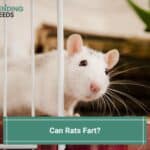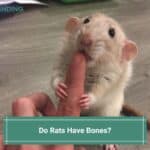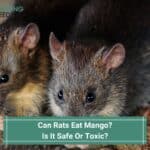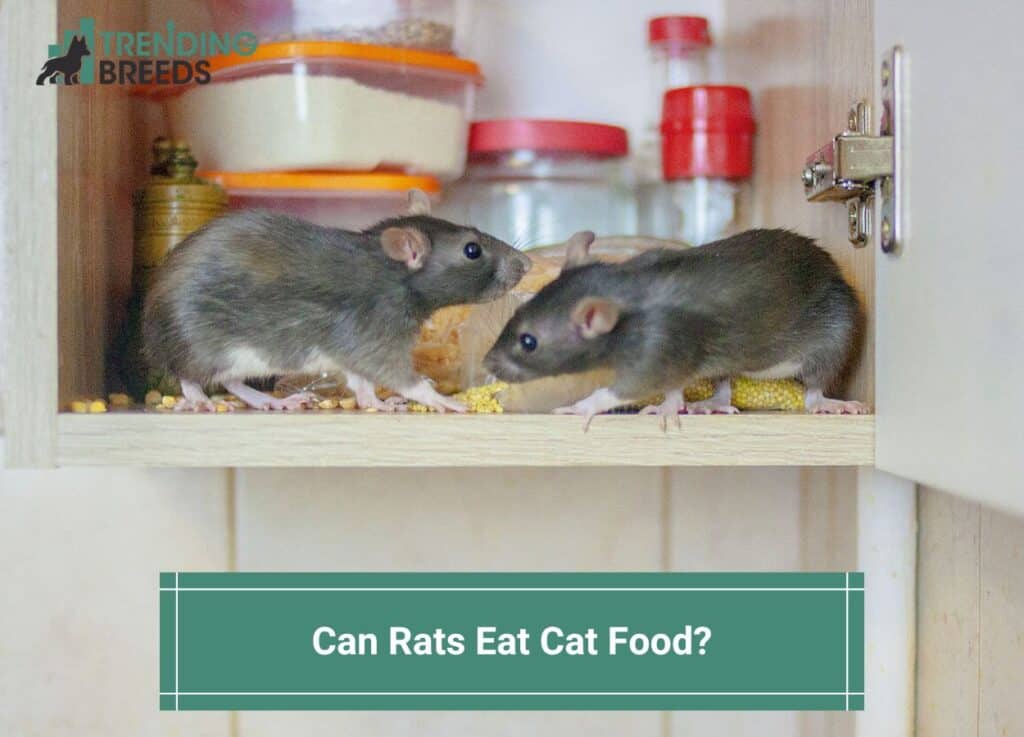
Perhaps you’ve been wondering what makes the cat food, dog food, and rat food in your cupboard different from one another.
If you were to just serve your rat all the same food, it would be considerably simpler. But is it okay to give your pet rats cat food? Which meal is ideal for rats?
Feeding your rats a small amount of cat food won’t affect them if there isn’t anything else in the house to feed them with.
No ingredient in cat food is intrinsically hazardous for pet rats. However, cat food is not the ideal option for your cheeky rats because it was not developed with their nutritional needs in mind. You should not regularly feed your rat cat food.
Continue reading to learn why cat food is not the best choice and what you should feed your rats in its place.
Other articles you would like: Can Rats Fart? and Can Rats Eat Mangoes?
Table of Contents
Can Rats Eat Cat Food?
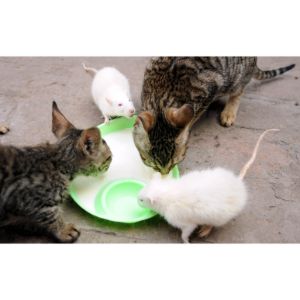
Cat food is not safe for rats and should not be used as a primary source of nutrition for them. The high protein and fat content, as well as the lack of essential vitamins and minerals, can lead to serious health problems for rats.
Rats have different dietary needs and require a diet specifically formulated for them. It’s always best to provide rats with a diet that is specifically formulated to meet their nutritional needs, which can be found in pet stores and online.
Feeding them cat food can lead to malnutrition and serious health problems and should be avoided.
Reasons Why Cat Food Shouldn’t be Given to Rats
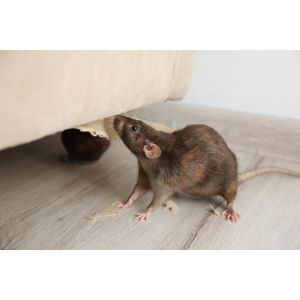
Here are some reasons why cat food should not be given to rats:
Protein Content
Cat food typically has a much higher protein content than rat food. Rats require a diet that is mostly composed of carbohydrates and a small amount of protein. A diet high in protein can lead to liver and kidney damage in rats.
Fat Content
Cat food also tends to have a higher fat content than rat food. Rats have a low tolerance for fat in their diet, and consuming a diet high in fat can cause obesity and other health issues.
Vitamin and Mineral Content
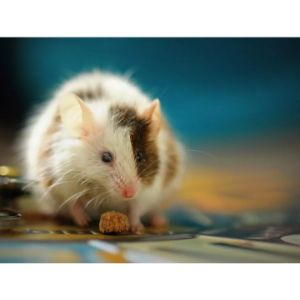
Cat food is formulated to meet the specific nutritional needs of cats, which are different from rats. Rats require a diet that is high in vitamin D and calcium, which cat food does not provide.
Size and Texture of Food
Cat food is often formulated in larger chunks or kibble, which can be difficult for rats to eat and may cause dental problems. Rats have small mouths and teeth, and require smaller, softer food.
Taste Preference
Rats may not find cat food palatable and may not eat it, leading to malnutrition. Rats have different taste preferences and may not be attracted to the flavors and ingredients used in cat food.
Health Risks of Feeding Rats Cat Food

Here are some of the potential health risks associated with feeding rats cat food:
Protein Toxicity
A diet high in protein can place a significant burden on the liver and kidneys of rats, which can lead to serious organ damage and even death.
Fat Accumulation
Rats have a low tolerance for fat in their diet, and consuming a diet high in fat can cause obesity, fatty liver disease, and other health issues. These conditions can lead to further health problems and shorten the lifespan of the rat.
Nutrient Deficiencies
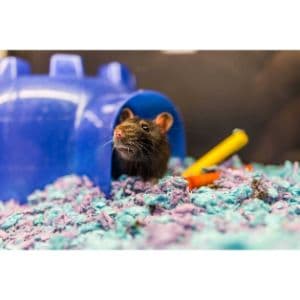
Cat food is formulated to meet the specific nutritional needs of cats, which are different from rats. Rats require a diet that is high in vitamin D and calcium to support the growth and development of their bones and teeth.
A diet that is deficient in these essential nutrients can lead to malformations in bones and teeth, as well as other health problems.
Dental Problems
Cat food is often formulated in larger chunks or kibble, which can be difficult for rats to eat and may cause dental problems. The hard kibble found in cat food can wear down their teeth and cause pain and infection.
Palatability and Appetite Loss
Rats have different taste preferences and may not find cat food palatable. If they don’t eat it, they can become malnourished and suffer from weight loss, weakness, and other health issues.
Can Rats Eat Wet Food?
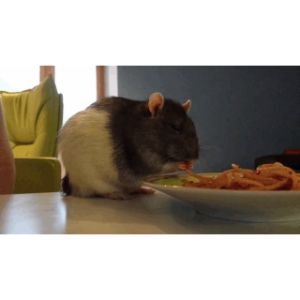
Both wet and dry cat food is unfit for rats. Both are unsuitable for rats since they have the same nutritional profile.
Dry cat food is simpler to feed, though. Due to the addition of grains and other ingredients to help the meal hold together, dry food also has a tendency to contain more carbs.
Cheaper cat chow often has the most carbs. So, if you are forced to feed your rat cat food, it can be the best choice for them.
Rats may be “bulked up” by feeding them wet cat food, according to some individuals. Nevertheless, it has a great deal of protein and is deficient in the vitamins and minerals it requires.
Because of this, we absolutely do not suggest it. Instead, offering suitable rat food would be your best course of action. The dietary requirements of your rat are significantly better met by them.
What Should the Ideal Rat Diet Be Composed Of?
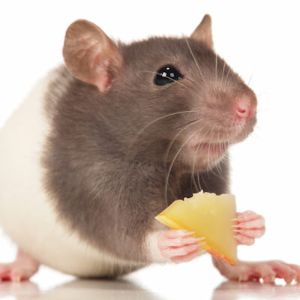
Rats have specific dietary needs that must be met in order to ensure their overall health and well-being. The best foods for rats include a variety of fresh fruits and vegetables, a high-quality rat pellet, and occasional treats.
Fresh Fruits and Vegetables
Rats require a diet that is high in carbohydrates and low in protein.
Fresh fruits and vegetables, such as carrots, apples, lettuce, and broccoli, provide essential vitamins and minerals, as well as important fiber for maintaining a healthy digestive system.
It’s important to wash fruits and vegetables thoroughly before feeding them to your rat; avoid giving them fruits with seeds or pits, as they may cause intestinal blockages.
High-Quality Rat Pellet
Rat pellets are specially formulated to meet the nutritional needs of rats, providing a balanced diet that includes the necessary vitamins, minerals, and proteins.
It’s important to select a high-quality pellet that is made from natural ingredients and doesn’t contain any artificial colors, flavors, or preservatives.
Treats
Treats should be given to rats in moderation and should not make up more than 10% of their diet. Treats such as small pieces of cooked meat, cooked eggs, or small amounts of yogurt can provide a source of protein.
However, it’s important to avoid giving them too many treats, as this can lead to obesity and other health issues.
Water
Rats need access to fresh water at all times. It’s important to provide them with a clean water bottle and change the water daily to ensure that it’s always fresh.
Other Foods That Rats Shouldn’t Eat
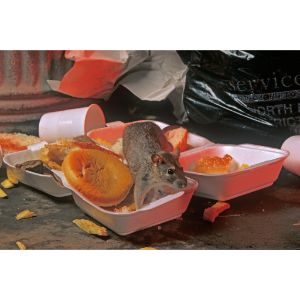
There are certain other foods that rats should not eat. These foods can be harmful to their health and lead to serious health problems.
High-Fat Foods
Foods that are high in fat, such as nuts, seeds, and oils, should be avoided as they can cause obesity, fatty liver disease, and other health issues. Rats have a low tolerance for fat in their diet, and consuming a diet high in fat can lead to serious health problems.
Processed Foods
Processed foods, such as junk food, should be avoided as they are high in artificial colors, flavors, and preservatives, which can be harmful to rats’ health.
They also typically contain high levels of sugar, salt, and unhealthy fats, which can be detrimental to their health.
Chocolate
Chocolate contains theobromine, a compound that can be toxic to rats. Consuming too much chocolate can lead to symptoms such as vomiting, diarrhea, and seizures, and in severe cases, it can be fatal.
Alcohol

Rats should not consume alcohol as it can lead to serious health problems, including liver and kidney damage, as well as central nervous system depression.
Coffee
Rats should not consume coffee or any other caffeine-containing products, as caffeine can lead to symptoms such as restlessness, tremors, and rapid breathing.
Dairy Products
Rats are lactose intolerant and should not consume dairy products such as milk, cheese, and yogurt. Consuming dairy products can lead to symptoms such as diarrhea and gas.
Foods with High-Sugar Content
Rats should not consume foods with high sugar content, such as candy, as they can lead to obesity and other health problems.
Conclusion For “Can Rats Eat Cat Food?”
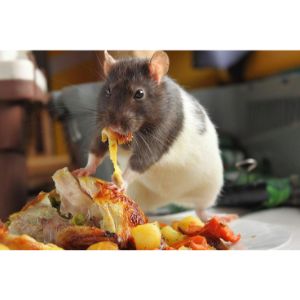
Rats shouldn’t be fed cat food. Rats who eat it won’t be harmed because it isn’t toxic. But it does not give your rat the nutrition it requires. In contrast to rats, which are omnivores, cats are carnivores.
Their eating plans are not comparable. The food of one animal cannot support the growth of another.
We advise selecting a commercial food made especially for rats in its place. In contrast to cat food, this will give your rat the vitamins and minerals they require.
You will also like:
You can learn more about rats by watching “How to Care for Pet Rats” down below:

